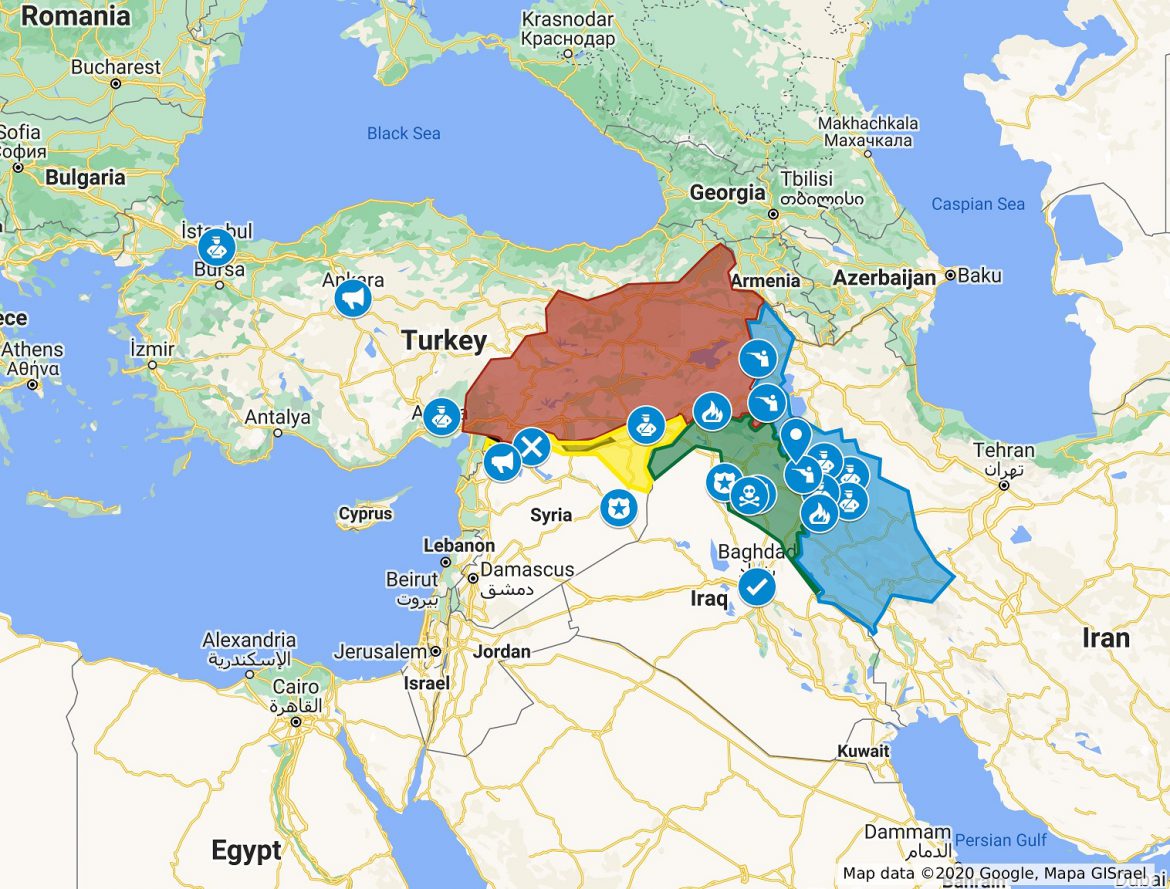1.3K
Iran
- Iranian security forces arrested two Kurds, Saman Hakim and Mohammed Skeikhzada, on Sunday in Sarvabad. Iranian authorities also arrested a Kurdish man named Ayoub Agharazai in Divandarreh (Diwandara) and another named Mohsen Saleni in Hawraman. Saleni was denied legal representation following his arrest. Meanwhile, a former member of a Kurdish opposition group named Faiq Youysifi was sent to prison to begin serving a six-month sentence in Saqqez. Concurrently, a Kurdish female activist named Andesha Sadri, who was initially arrested on October 7, 2020, was transferred from the custody of Iranian intelligence officers (Ettela’at) to begin serving a prison sentence. Lastly, the Kurdistan Human Rights Association (KMMK) reported Ettela’at arrested a 14-year-old named Sena Nekaie in Marivan last Tuesday and claimed the intelligence officers posed as education officials to set up the arrest.
- The Kurdish border porters known as Kolbars faced another week of death and injury at the hands of the Iranian regime and Turkish authorities. On Saturday, Turkish border guards ambushed a group of Kolbars near Urmia, killing a Kolbar named Mohsin Qassimi and severely injuring his brother, Moslih Qassimi. On Wednesday, Iranian border guards critically wounded a Kolbar named Adris Barzan near Baneh. Iranian border guards also wounded a Kolbar named Awara Fathi near Sardasht on Thursday and killed a Kolbar named Siawesh Korsoni near Khoy on Monday. Finally, a Kolbar named Logman Rahimi was left permanently disabled when he struck a mine from the Iran-Iraq War in Paveh (Pawa).
Iraq
- Iraq’s Kurdish political parties and leaders paid tribute to the late Kurdish leader, activist, neurosurgeon, and former governor of Kirkuk Governorate, Dr. Najmaldin Karim. Dr. Karim’s remains will be buried in Erbil and will eventually be transferred to his hometown of Kirkuk once it is liberated from Iranian-backed militias and the martial law imposed by the Government of Iraq. Iraqi security forces banned public activities mourning the death of Dr. Karim in Kirkuk and removed posters of him hung throughout the city.
- Tensions rose between the Kurdistan Democratic Party (KDP) and the Kurdistan Workers’ Party (PKK) after the PKK attacked a Turkish-owned pipeline transporting oil from Iraqi Kurdistan to Turkey. The Kurdistan Regional Government (KRG) issued a statement that described the attack as terrorism and read, “The KRG will never allow threats against its interests and the livelihood of the peoples of the Kurdistan Region. An investigation has already been launched to determine those behind the attack.” Despite the KRG’s statement, however, Turkey’s military incursion into Iraqi Kurdistan continued.
- The Council of Representatives of Iraq (CRI), following an agreement between Kirkuk Governorate’s Kurdish parties and non-Kurdish residents regarding its electoral constituency, passed a law cementing a new constituency in the governorate on Wednesday and concluded voting on Iraq’s election laws. Kirkuk Governorate will now be divided into three electoral constituencies encompassing its east, west, and center.
- Peshmerga forces, supported by the US-led coalition, raided an ISIS (Da’esh) lair near the Makhmour District’s Qarachokh area. At the same time, security forces arrested at least three senior Da’esh leaders in Kirkuk. Likewise, Iraqi federal police killed a Da’esh terrorist planting an IED and wounded another in the Rashad sub-district of Kirkuk Governorate’s Hawija District.
Syria
- Turkish-backed jihadist groups launched additional indirect fire attacks on several villages outside the Turkish-occupied zone near Manbij, Ain Essa, and Geri Spi (Tal Abyad). The co-leader of Manbij’s local administration Mohammed Sheiko responded by calling for the international community to pressure Turkey to stop attacks on Manbij because they target civilians. Of course, the continuing string of indirect fire attacks has also stoked fears among the region’s Kurdish population of a new Turkish invasion.
- The Syrian government continued to ratchet up its economic pressure campaign targeting tens of thousands of displaced people from Afrin in the al Shabah region near Aleppo, with a local Kurdish leader named Mohammed Naso claiming the Assad regime’s policies are in line with those enacted by Turkey following its 2018 invasion. Naso went on to say, “The government of Damascus imposes a suffocating siege on the area and prevents the entry of materials into al Shahba, and if it agrees to enter it, it imposes large customs fees on it. Its practices have reached the point of confiscating food, fuel, and medical supplies coming from northern and eastern Syria.”
- The Syrian Democratic Forces (SDF) carried out another series of raids targeting Da’esh cells in northeastern Syria, capturing a senior Da’esh leader and several other terrorists in Deir Ez Zor Governorate’s al Basira town. The detained Da’esh leader, known as “Abu Jihad al Ansari,” was responsible for planning and executing numerous terrorist attacks in the region.
Turkey
- Turkish authorities arrested additional Kurdish activists and members of the pro-Kurdish Peoples’ Democratic Party (HDP) last week. In Istanbul, Turkish police detained three HDP members named Raif Altunhisar, Ercan Yücesan, and Volkan Eren on Wednesday. On that same day, Turkish authorities arrested three more HDP members in Nusaybin, including HDP assembly member Samiye Demir. Lastly, on Friday, Turkish authorities detained five HDP members and supporters in Adana for “helping an illegal organization.”
- The HDP released a statement expressing its solidarity with France following the Da’esh-inspired terrorist attack in Nice on October 29. Concurrently, the HDP’s Migration and Refugee Commission criticized Turkish President Recep Tayyip Erdogan and the Turkish government’s use of Syrian refugees as political props and released a statement that read, “While no parties, unions and democratic mass organizations are even allowed to go out on the streets or make a press statement, which is the most basic right of freedom of expression, the fact that radical Salafist elements can act freely shows the government’s open relationship with these groups and the support it gives to these groups.”

